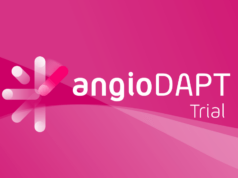One-month dual antiplatelet therapy (DAPT) followed by 12 months of clopidogrel monotherapy leads to a greater reduction in bleeding events following percutaneous coronary intervention (PCI) compared to 12-month dual antiplatelet therapy, without an increase in ischaemia. Hirotoshi Watanabe (Kyoto University, Japan) announced findings on behalf of the STOPDAPT-2 investigators at a late breaking trial session at the American College of Cardiology’s (ACC 2019) 68th Annual Scientific Session (16–18 March) in New Orleans, Louisiana, USA.
He said: “One-month dual antiplatelet therapy followed by clopidogrel monotherapy provided a net clinical benefit for ischaemic and bleeding events over 12-month DAPT with aspirin and clopidogrel after implantation of a cobalt chromium everolimus-eluting stent. The benefit was driven by significant reduction in bleeding events without increase in ischaemic events.”
Current guidelines recommend dual antiplatelet therapy, a combination of aspirin and a P2Y12 inhibitor such as clopidogrel, for at least six or 12 months following PCI. STOPDAPT-2, a prospective, open label, multicentre randomised trial, aimed to evaluate the safety and efficacy of a one-month dual antiplatelet therapy regimen followed by clopidogrel monotherapy against standard therapy with a newer generation of drug-eluting stent.
Inclusion criteria were PCI with a cobalt chromium everolimus-eluting stent (Xience, Abbot) and no plan for staged PCI. Patients on an oral anticoagulant or with a history of intracranial haemorrhage were excluded. In all, 3,045 participants were enrolled at 89 medical centres in Japan, and randomised 1:1 to one month of dual antiplatelet therapy followed by clopidogrel monotherapy for five years (n=1,523), or to 12 months of dual antiplatelet therapy followed by aspirin monotherapy for five years (n=1,522). Mean age was 68 years, and 21% were female; 39% of subjects had diabetes, and 62% had stable coronary artery disease.
The primary endpoint was a composite of cardiovascular death, myocardial infarction (MI), stent thrombosis, stroke, and thrombolysis in myocardial infarction (TIMI) major/minor bleeding rates at one year. Major secondary outcomes were an ischaemic composite endpoint—cardiovascular death, stent thrombosis, myocardial infarction, and stroke—and a bleeding endpoint of TIMI major/minor bleeding.
The primary outcome at one year occurred in 2.4% of the one-month DAPT group compared with 3.7% of the 12-month DAPT group (hazard ratio [HR] 0.64, 95% confidence interval [CI] 0.42–0.98, p superiority=0.04). There was evidence of possible treatment interaction favouring 12 months of DAPT among those with chronic kidney disease.
The secondary ischaemic composite outcome at one year occurred in 2% of the one-month DAPT group compared with 2.5% of the 12-month DAPT group (HR 0.79, 95% CI 0.49–1.29, p noninferiority=0.005). Rates of TIMI major/minor bleeding at one year were 0.4% among subjects receiving one-month DAPT versus 1.5% among those on 12-month DAPT (HR 0.26, 95% CI 0.11–0.64, p superiority=0.004).
And rates of Bleeding Academic Research Consortium (BARC) 3 or 5 bleeding at one year were 0.5% among those receiving one-month DAPT compared with 1.8% of those in the 12-month DAPT group (p=0.003).
However, Watanabe conceded the limitations of the study, which included the open label design, and a lack of consensus on the use of the net adverse cardiovascular events of ischaemia and bleeding as a primary endpoint. Additionally, the limited enrolment of patients at high ischaemic risk, and the lower incidence of ischaemia among Japanese patients with coronary artery disease reduces the applicability of the findings to European or US subjects.
Follow-up will continue to five years.
A second study, also presented as a late breaking trial at ACC 2019, prospectively randomised 2993 patients undergoing PCI with an everolimus or sirolimus eluting stent in 33 centres in Korea to either P2Y12 inhibitor monotherapy after three months of DAPT, or to dual antiplatelet therapy for 12 months. The SMART CHOICE trial found that 12 months after the index procedure, for the primary endpoint of major adverse cardiac and cerebrovascular events, P2Y12 inhibitor monotherapy was non-inferior to standard therapy of 12-month DAPT. Additionally, monotherapy reduced the risk of bleeding compared to standard therapy. Announcing the findings, Joo-Yong Hahn (Samsung Medical Centre, Seoul, South Korea) said: “Our trial suggests that P2Y12 inhibitor monotherapy after short duration of DAPT is a novel antiplatelet strategy balancing ischaemic and bleeding risk in patients undergoing PCI.”
SMART CHOICE was an open label non-inferiority trial in which key exclusion criteria were active bleeding, previous implantation with a drug eluting stent within the previous 12 months, or contraindication to study medication. Mean age of patients in each group was 64 years, and around 70% were male. Patient characteristics for rates of diabetes mellitus, acute coronary syndrome, hypertension and stable ischaemic heart disease were similar in both groups; 1495 subjects were included in the intention-to-treat analysis of monotherapy, and 1498 in the intention-to-treat analysis of dual therapy.
At one year, rates of the primary outcome were 2.9% among the monotherapy cohort and 2.5% for those on dual therapy (hazard ratio [HR] 1.19, 95% confidence interval [CI] 0.76–1.85, p=0.46). Rates of bleeding BARC 2–5 were 2% and 3.4% in the monotherapy and dual therapy groups, respectively (HR 0.58, 95% CI 0.36–0.92, p=0.02). Results were consistent between the three-month landmark analysis and per-protocol analysis.
Outlining the significance of the findings, Hahn tells Cardiovascular News: “Our trial has several strengths compared with other trials of P2Y12 inhibitor monotherapy—use of three kinds of P2Y12 inhibitors, use of three widely used current generation drug eluting stents, and PCI procedures similar to real world practice. We believe that the SMART-CHOICE trial provides generalisable answers to the concept of P2Y12 inhibitor monotherapy across a broad spectrum of patients with implantation of current generation drug eluting stents, and the results can be directly applicable to real world practice.”












